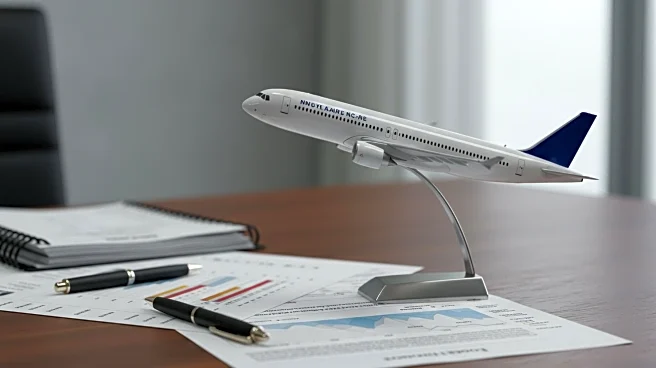What is the story about?
What's Happening?
Spirit Airlines has recently issued a regulatory filing indicating 'substantial doubt' about its ability to continue operations over the next 12 months. This filing has raised concerns about the airline's financial stability, particularly as its current credit card processor agreement is set to expire at the end of 2025, requiring more collateral due to financial uncertainties. In response, CEO Dave Davis has sent a memo to employees, downplaying the risks highlighted in the filing. Davis emphasized that the statement was a requirement from outside auditors and assured that the company is implementing changes to mitigate these risks. He outlined plans to strategically grow Spirit's network in stronger markets, re-evaluate unprofitable routes, and improve revenue management systems. Davis expressed confidence in Spirit's ability to continue providing value to consumers and maintain its role in the U.S. aviation industry.
Why It's Important?
The financial challenges faced by Spirit Airlines are significant, as they reflect broader issues within the ultra-low-cost carrier segment of the aviation industry. The airline's ability to navigate these challenges is crucial for maintaining competitive pricing and service options for consumers. If Spirit fails to stabilize its financial situation, it could lead to reduced market competition, potentially increasing airfares and limiting choices for travelers. The airline's strategic adjustments, such as focusing on profitable routes and enhancing revenue systems, are essential for its survival and continued contribution to the industry. The outcome of these efforts will impact not only Spirit's employees and stakeholders but also the broader aviation market dynamics.
What's Next?
Spirit Airlines is expected to continue implementing its strategic plan to address financial concerns. This includes growing its presence in profitable markets and making difficult decisions regarding unprofitable routes. The airline will also focus on improving its revenue management and product sales strategies. Stakeholders, including employees and business partners, will be closely monitoring these developments. The expiration of the credit card processor agreement at the end of 2025 will be a critical juncture, requiring Spirit to secure necessary collateral and financial arrangements to ensure continued operations.
Beyond the Headlines
The situation at Spirit Airlines highlights the challenges faced by ultra-low-cost carriers in maintaining profitability amidst industry shifts. As airlines struggle to find profitable routes, the role of frequent flyer programs and ancillary revenue becomes increasingly important. Spirit's efforts to adapt may influence broader industry practices, potentially leading to shifts in how low-cost carriers operate and compete. The airline's focus on strategic growth and revenue management could serve as a case study for other carriers facing similar challenges.
















